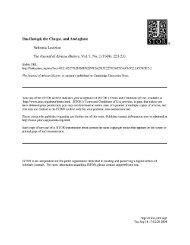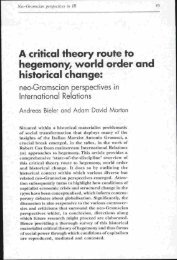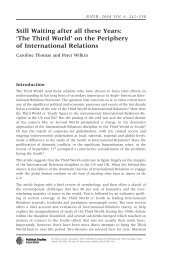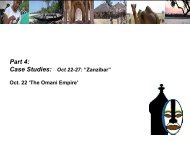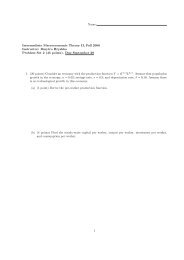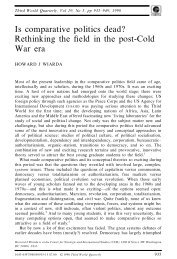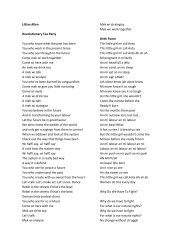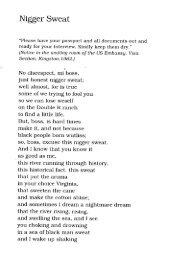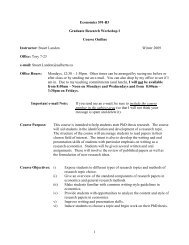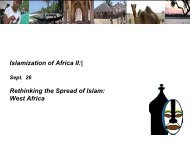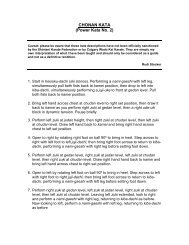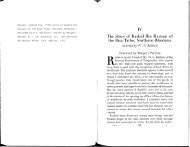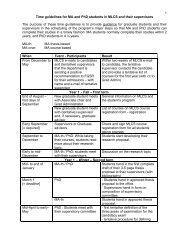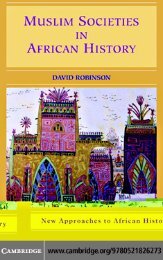personal memories revolutionary states and indian ocean migrations
personal memories revolutionary states and indian ocean migrations
personal memories revolutionary states and indian ocean migrations
Create successful ePaper yourself
Turn your PDF publications into a flip-book with our unique Google optimized e-Paper software.
. . . if their background gave them an initial intellectual advantage,<br />
it also imposed burdens that non-Muslims would not have faced.<br />
Like members of Muslim communities elsewhere, the Lamuans<br />
naturally assume that their reception of Islam is the correct one,<br />
<strong>and</strong> so they first regarded the Zeins [Zein’s wife Laila <strong>and</strong> son<br />
Hani accompanied him to Lamu] as ignorant, if not positively<br />
heretical. The dem<strong>and</strong>s made upon them to correct their errant<br />
ways were sometimes quite uncomfortable. 23<br />
Perhaps because of this experience or because he was a Muslim, an<br />
Egyptian <strong>and</strong> a scholar in the West, 24 Zein was concerned with finding a way to<br />
move beyond similar debates in anthropology—to escape from his own loop. In<br />
the last article he published before his death, Zein examined works by some of the<br />
major anthropological <strong>and</strong> Islamicist theorists of his day <strong>and</strong> their arguments about<br />
anthropology <strong>and</strong> Islamic theology as tools for underst<strong>and</strong>ing the interplay between<br />
religion <strong>and</strong> social behavior. The anthropologists included Clifford Geertz (Islam as<br />
a historically constituted ideology), Vincent Crapanzano (a Freudian interpretation<br />
of Moroccan myths), <strong>and</strong> D.F. Eickelman (a Weberian interpretation of<br />
Maraboutism in Morocco). The Islamicists were Abdallah S. Bujra (religious<br />
politics) <strong>and</strong> Michael Gilsenan (Sufism <strong>and</strong> charisma). 25 Zein argued that neither<br />
the ideological assumptions of anthropologists nor the theological assumptions of<br />
Bujra <strong>and</strong> Gilsenan could account for the everyday experience of a given society<br />
because all of these approaches require some kind of universal <strong>and</strong> fixed notion<br />
about the nature of “man, God, history, consciousness, <strong>and</strong> meaning.” They all<br />
portray Islam as a closed cultural system. Further, they all assume that religion,<br />
economy <strong>and</strong> history are things—bounded entities—that exist outside or above the<br />
societies in which people construct relationships with others <strong>and</strong> with their<br />
environment on a daily basis.<br />
Today, such ideas are commonplace, though sometimes contested, among<br />
anthropologists, sociologists, cultural studies scholars <strong>and</strong> historians. The reified<br />
category is under attack from all sides. 26 Examining the daily practices of ordinary<br />
people, as Zein advocated both in Sacred Meadows <strong>and</strong> in his later article, is evident<br />
in much current scholarship, especially the influential work by Michele de Certeau,<br />
The Practice of Everyday Life. 27 Some postmodernist <strong>and</strong> postcolonial scholars now<br />
bemoan the lack of historicity in theoretical <strong>and</strong> philosophical approaches to<br />
various fields of study in the humanities <strong>and</strong> social sciences. The quintessential<br />
postmodern scholar Fredric Jameson, looking for a way out of the “vicious circle”<br />
created by the “hegemony of theories of textuality <strong>and</strong> textualization,” offers<br />
“historicism” as an alternative. He asserts that in order to “play the game” scholars<br />
<strong>and</strong> critics are trapped by their need to agree with “basic presuppositions of [their]<br />
general problem field” which “traditional positions . . . refuse to advance.”<br />
Historical analysis <strong>and</strong> an assertion of the “real” offer a way out. 28 “Postcolonial”<br />
anthropologists such as Lila Abu-Lughod for example, attempt to historicize <strong>and</strong><br />
contextualize the study of religion, tying their observations to a past as well as the<br />
present in order to appreciate their subjects more fully. 29 This may seem flattering<br />
to us as historians, but the example of the history of Islam in East Africa<br />
demonstrates that “history” is not an answer in itself. “Loops” <strong>and</strong> “vicious<br />
circles,” plague historians as well as literary critics <strong>and</strong> anthropologists.<br />
As an ideal, focusing on change over time <strong>and</strong> the mundane details of the<br />
everyday are laudable goals, especially for one who aspires to write social or cultural<br />
http://web.mit.edu/cis/www/mitejmes/<br />
13



